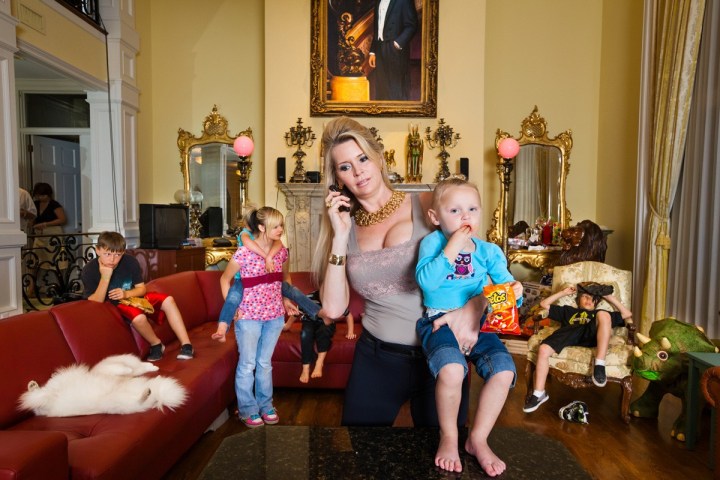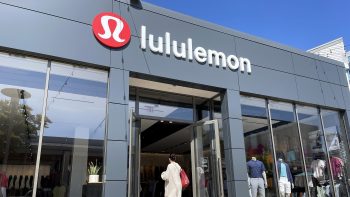
Q&A: “Queen of Versailles” director Lauren Greenfield

Lauren Greenfield and Jackie Siegel have been through a lot together.
A chance meeting at a photoshoot led Greenfield, a photographer and filmmaker, to start filming Siegel’s family, before the 2008 financial crisis threw their finances in a tailspin. The Siegels eventually sued Greenfield over the resulting documentary, “The Queen of Versailles,” and later traded on the film’s success for a reality TV show. The mansion at the heart of the film is still unfinished, but Greenfield and the Siegels have mended fences. They’re even working on a Broadway musical together.
Marketplace’s Ellen Rolfes got Greenfield on the phone to talk about her work and Americans’ changing attitudes about home. This interview has been edited for space and clarity.
Can you tell us a bit about how “The Queen of Versailles” came together? How much time were you able to spend with the Siegel family?
It happened very organically, in that, you know, I had no idea how this would end up. I met Jackie [Siegel], while I was on assignment for Elle Magazine, photographing Donatella Versace. And I was supposed to be following Donatella, and I see these three women, Jackie and her two friends, who were so incredible.
Jackie said she had eight kids, and she showed me this picture of the kids all on the stairs of their private plane. At the time, I had been working on a project, a multi-year project about wealth, which ended up becoming my movie and show and book, “Generation Wealth.” One of [Jackie’s] friends said, “You really should photograph Jackie.”
So, I arranged to go see Jackie and did a series of photographs. I didn’t have a crew. I just had my video camera and an assistant. We did a small interview, very rough. And I basically just kind of fell in love with her and her story. I was thinking about the American dream and how it was kind of like this house. Jackie and David both came from modest beginnings and this was, like, their fantasy of wealth.
I ended up going [to film the Siegels] about 10 times, usually for a week or two. Timing wise, we were very lucky. We were just there at a lot of key moments and during a lot of change. And by the time we finished, I knew I had a good story.
The Siegels are sort of like this extreme case study of aspirational wealth. It’s supersized, literally. How relatable do you think their story is for the layperson?
I mean, when I started the film, I didn’t think people would be able to compare themselves to [the Siegels], until their house went into foreclosure. Jackie was also really smart about that connection. She kept saying to me, “What’s happening to us is what’s happening to everybody else, but at a different level.”
I found that the story wasn’t about greed or accomplishment. It was about addiction. And I really learned that from the Siegels, because, by any measure, a 26,000-square-foot home is gigantic. And that was their starter mansion. The fact that that wasn’t enough, was kind of like proof positive that nothing is ever enough.
David Siegel had a great line, which I didn’t use in the movie and I always regretted it, where he said, “Money doesn’t make you happier, it just makes you miserable in a better part of town.” And I think that really speaks to, you know, once you’re on that treadmill, you can’t get off until, like an addiction, you kind of hit rock bottom. What happens at rock bottom? Is there a possibility for change? I think that is a really interesting question.
We’ve covered Americans’ changing taste in houses in this newsletter. Do you think that the cultural importance of the home has changed since 2012?
During COVID, I think that people started thinking more about the home as a place of shelter and a place of family. It wasn’t as much about being a status marker, which was what all my work has been about: the home as this embodiment of our kind of consumeristic impulses and our desire for status markers.
[But] when we don’t have a financial crash anymore, people [may] go back to the same behaviors. So, I’m not saying it’s permanent. At the end of “The Queen of Versailles,” I was so fortified to have this ending, which in some ways, was a happy ending, where they had shifted their values and realized what was important to them. Jackie realizes she loves David and loves her family and just wants a small house with bunk beds. But once their conditions changed, they went back to building the house. Cut to 11 years later, and the house is still in progress.
I don’t know if this shift with the home [as a symbol of shelter rather than status] will change again. I was just talking to my mom [Patricia M. Greenfield, a distinguished professor of psychology at University of California, Los Angeles] about it. She said that her research shows things will go back, but that she felt there would be a lasting effect for young people, for kids between the ages of 9 and young adult.

One of the central pillars of the American dream was the idea that Americans would be able to own their own home, but there’s a persistent gap between median household income and how much Americans would need to make to comfortably afford a home at the median price.
[Buying a] home hasn’t been available to a lot of people for a long time. And that’s why when money was so cheap [in the 2000s] and you had things like no down payment loans, people were just grabbing at it. It was a chance to have this kind of gold ring that the American dream promises. And I think that’s why people were so vulnerable to the kind of predatory lending that happened. I’m sure if it happened again, people would be equally vulnerable.
And the way we define “success,” that gold ring, is often driven by movies, TV, advertisements.
That’s what [economist] Juliet Schor tracks, the increase of luxury in the media. We went from watching shows like “All in the Family” and “Happy Days” to “Dynasty” and “Dallas,” and “Keeping Up with the Kardashians.”
With that in mind, what do you think of the Siegels’ reality TV show, “The Queen of Versailles Reigns Again”?
I think it’s an expression of what they always wanted, which was to have this status marker [the house] and get the maximum number of people to see it. That’s probably why they did the documentary, and that’s why they’re doing the reality show. Jackie has always wanted fame. So, I think it’s kind of a natural outgrowth of their characters.
I hope people go back to watch the original film though, because I think what we lose in the reality show — which I actually haven’t seen, but I can imagine because it’s a reality show about finishing the house, which is still not finished — what we lose is the morality tale. The movie is a morality tale. And the musical will also be a morality tale.
Right! There’s a Broadway musical version of “The Queen of Versailles” in development? What can you tell us about it?
Oh, it’s very exciting. Stephen Schwartz is writing the music and he’s genius. I’ve heard a lot of the songs and they’re incredible, and Kristin Chenoweth is playing Jackie, and she, you know, is just an incredible talent with an incredible voice and also looks a lot like Jackie. I expect it to go to Broadway sometime in the [fall of 2024].
We are also excited to produce this in collaboration with David and Jackie Siegel. I don’t know if you remember, when “The Queen of Versailles” came out, David Siegel sued Sundance and me for calling the documentary a “rags-to-riches-to-rags” story, not realizing at the time that he had said that in the movie. We ended up winning the lawsuit, and they ended up paying $750,000 in legal fees. I’m just really excited that, you know, 10 years later, we’re all happily involved in this musical that I can’t wait for audiences to see.
“The Queen of Versailles” is available to stream on several platforms with a subscription, including Kanopy, Hoopla and Prime Video. It’s also available to stream for free with ads on YouTube, Pluto TV and Plex.
It is also available to rent or buy on several platforms.
Check out all our past selected films.
Correction (Mar. 27, 2023): A previous version of this story misidentified Patricia M. Greenfield’s position at UCLA.
There’s a lot happening in the world. Through it all, Marketplace is here for you.
You rely on Marketplace to break down the world’s events and tell you how it affects you in a fact-based, approachable way. We rely on your financial support to keep making that possible.
Your donation today powers the independent journalism that you rely on. For just $5/month, you can help sustain Marketplace so we can keep reporting on the things that matter to you.


















